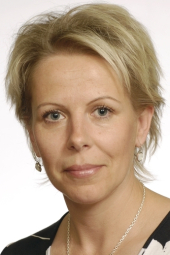The V department aka acute department of the Medical Centre’s psychiatry clinic consists of a reception complex and acute treatment rooms with 15 beds for men and women. There are 5 psychiatrists, 20 medical nurses, 39 caretakers, a secretary, an activity instructor and security workers.
In the reception block, a nurse and a doctor are on call 24 hours a day. The nurse on call conducts triage to assess the state of emergency for patients who have come to the department on their own. When there is no indication for emergency care, the nurse on call refers the patient according to the help needed to either the family physician or to an appointment with an outpatient psychiatric nurse in the polyclinic of the psychiatry clinic.
The doctor on call gives emergency care during emergencies, with referral and to patients who have been triage-assessed by the nurse on call as needing emergency care (mostly due to acute psychosis and high risk of suicide). Additionally, the doctor on call is responsible for the health condition and safety of the patients during the entire stay in the clinic even when not at work and gives consultative help via phone to ambulance workers and doctors on call in other hospitals. The doctor on call does not conduct phone consultations for patients and does not give information to the relatives of patients.
The doctor on call gives explanations to the patient about their condition and treatment options. If hospital care is indicated, the patient will overview the conditions of the treatment contract and needs to sign a consent form. Afterwards, the patient is referred to a suitable department for their condition.
Treatment procedures in the acute cases wards
Both the men’s and women’s acute cases wards have 15 beds.
While in the department, the patients undergo thorough screenings (labs, EKG, brain and other organ imaging or endoscopy), with consultations often made with an internal medical specialist, neurologist and other specialists for the purpose of refining the diagnosis. A psychiatrist evaluates the patient’s psychological state, makes a diagnosis and prescribes treatment.
The treatment is based on various modern psychiatric medications administered either orally or in injected form, depending on the patient’s condition. Electro-impulse therapy is a safe and effective treatment method for depression, and agitation or psychomotor retardation states. The therapeutic procedures are performed for all patients who need a given procedure in the 5th Department, which has specially customized rooms and trained personnel. Before electro-impulse therapy commences, the patient is briefed on the nature of the therapy, the expected results and the necessary dietary restrictions. Thereafter the patient provides consent for the treatment.
While in the acute cases wards, the patients are under constant supervision by medical personnel. The personnel dispenses medication, monitors condition, provides guidance and assistance to patients in daily hygiene, encourages activity through physical exercises and activities within their abilities. To ensure safety of patients and employees, a security guard is stationed constantly in the men’s and women’s wards.
To ensure the rights of patients who have been involuntarily hospitalized, the Harju County Court conducts field hearings three times a week in the 5th Department. In the course of these hearings, a judge hears patient testimony and evaluates whether circumstances dictate the utilization of involuntary commitment. The state appoints the patient a defender for the protection of the patient’s constitutional rights. Permission or refusal for involuntary psychiatric commitment is issued by court decision.
When acute psychotic agitation and suicide risk have passed (usually patients are in the acute cases wing for a short time) most patients continue therapy in other departments of the Psychiatry Clinic or as outpatients. When compliance increases, the patient signs a therapy consent form and the involuntary treatment is ended.



